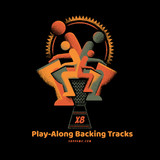Djembe Duo Magic
Part of what’s so fun about watching djembefolas is seeing the drama of the communication play out. In djembe duos, this can be especially exciting because the intensity and passion that can be seen during drumming is connecting the two people. It is an intimate vision, this conversation. Drummers talk without words all the time and sometimes, we are lucky enough to be embraced by their dialogue.
For thousands of years, drums have been used to celebrate, collaborate, and communicate. Across the plains of Africa, drums have historically been used to share vital information with neighboring tribes. Djembes play a part in this history, as well as the current transformations in the world of drumming. Modern drum circles the world round usually have a djembe or several as part of the group. This drum, in particular, seems to stir something in people, no matter their cultural backgrounds.
Watching two djembefolas play together can be an electrical experience, regardless of how loud or lightly they play. Djembe duos can play out a “call and response” technique, in which one drummer initiates the “conversation” and the other drummer responds, often repeating the beat. While there may be more repetition at first, eventually the drumming conversation mirrors verbal communication: it veers off-topic. We, as listeners, may find ourselves mesmerized by a fast-moving dialogue where the two drummers are feeding off each other.
Typically, we see in djembe duos what we see in any type of drumming duo situation. One drummer plays a rhythm and the other drummer plays in a complimentary way. This is beautiful and can become very hypnotic, with both drummers seemingly exchanging roles at will. When watching djembe duos drum this way, you understand that you are watching drummers who have spent many hours playing. They seem to become the rhythm, not just play it.

Of course, when playing in any kind of drumming duo, the drummers must tune their instruments properly. So that the listeners get a feel for the sound layering, it is important for the musicians to tune their djembes so that there isn’t too much of a difference in pitch. Personal tastes may determine exactly how that sounds, but the aim is for the drums to complement each other. In this way, djembe duos mimic verbal conversation, as well. It is fine to speak well on your own, but in a dialogue there must be some interconnection or the conversation makes no sense to listeners.
Recent Posts
-
X8 Drums Play-Along Backing Tracks
The new X8 Play-Along Series is being produced for our musician friends wanting a fresh way to work …9th Feb 2025 -
What is the Best Size Djembe for Beginners?
If you're new to the world of percussion and interested in learning the djembe, you're in for a t …16th Jul 2024 -
The Benefits of Becoming a Drumming Teacher: Transforming Passion into Profession
Why become a drumming teacher? Becoming a drumming teacher is an excellent way to share your pas …22nd May 2024




